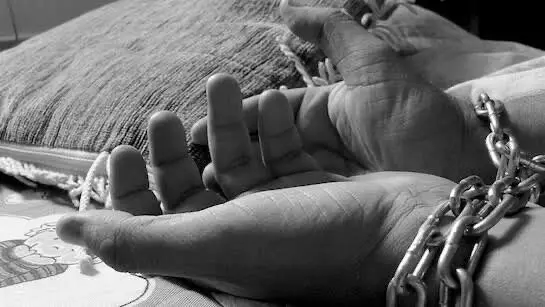World Day Against Trafficking in Persons: How traffickers use social media, fake job offers, marriages to trap girls
A poster reflecting the 2025 theme was unveiled as a public awareness tool
By Newsmeter Network
Representational Image
Hyderabad: Prajwala, an anti-trafficking organisation founded by Dr. Sunitha Krishnan, hosted a multi-stakeholder event on Wednesday to mark the World Day Against Trafficking in Persons.
The event aligned with the 2025 global theme, `Human Trafficking is Organized Crime – End the Exploitation’.
The event brought together key players from the government, civil society, and local community networks, aiming to increase awareness, build capacity among frontline workers, and push for systemic interventions against human trafficking in India.
Poster, Short Films, and Performance Spotlight: Hidden Networks of Exploitation
A poster reflecting the 2025 theme was unveiled as a public awareness tool. The design aimed to highlight how trafficking networks operate as organized criminal systems rather than isolated crimes.
Two short films directed by national award-winning filmmaker Rajesh Touchriver — titled The Game and Like, Subscribe and Share — were also released during the event. These films explore the lures of trafficking, especially the role of digital media in grooming and deception.
A dance-theatre performance by the Our Sacred Space team provided a visual narrative of trafficking survivors’ lived experiences, portraying the cycle of deception, entrapment, and eventual recovery.
Training Manuals for Ground-Level Stakeholders Released
D Seethakka, Minister for Women and Child Welfare, released a set of training manuals for frontline workers, developed by Prajwala. These manuals are tailored for:
• Anganwadi workers
• School teachers
• Village office assistants
“These manuals are crucial to building the capacity of the last-mile responders. Awareness and timely intervention at the community level are often what prevent trafficking before it begins,” said Seethakka.
Seetha Dayakar Reddy, Chairperson of the State Commission for Protection of Child Rights, and Ch Panchakshari, Member Secretary of the Telangana State Legal Services Authority, were also present, reiterating the need for an integrated approach involving law, education, and welfare services.
Law Enforcement’s Role Underlined
Mahesh M Bhagwat, Additional Director General of Police (Law & Order), addressed the gathering, highlighting the legal framework available under the Immoral Traffic (Prevention) Act (ITPA).
He emphasized that trafficking is rarely isolated and often backed by organized networks:
“We need to stop looking at trafficking as a social evil alone. It is a highly organized and profitable criminal enterprise that thrives on human misery.”
Bhagwat outlined key provisions of the ITPA, particularly Sections 3, 5, and 6, which relate to brothel-keeping, procuring, and detaining persons for prostitution. He called for better coordination between police, judiciary, NGOs, and local administration to ensure cases are not only booked but also lead to prosecution and rehabilitation.
Human Trafficking in India: A Persistent and Evolving Crime
India remains both a source and destination country for trafficking, with women and children constituting the majority of those affected. Trafficking for commercial sexual exploitation, forced labour, domestic servitude, and even organ trade continues despite legislation.
Dr. Sunitha Krishnan pointed out that traffickers often take advantage of poverty, lack of education, and social stigma.
“The modus operandi has evolved. Today, traffickers use social media platforms, fake job offers, and even marriages to trap vulnerable individuals. We must shift our response to be just as dynamic,” she said.
She also reiterated that survivor rehabilitation must go hand-in-hand with legal and enforcement efforts.
Call to Action
The event concluded with a joint appeal to the government and civil society to:
• Strengthen anti-trafficking units in police departments
• Ensure swift rehabilitation and reintegration services for survivors
• Conduct periodic awareness drives in schools, communities, and workplaces
• Create a national anti-trafficking helpline with multilingual support
Registrations and outreach from the event will feed into a longer-term strategy led by Prajwala and its partners to lobby for improved anti-trafficking legislation and survivor-centric support systems.
The event was part of Prajwala’s sustained campaign to not only combat trafficking but to alter the public’s understanding of it, as a crime of organized exploitation rather than isolated incidents of abuse.